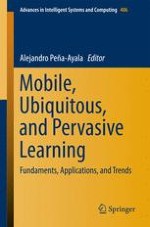
2016 | OriginalPaper | Buchkapitel
The Effect of Question Styles and Methods in Quizzes Using Mobile Devices
verfasst von : Takeshi Kitazawa, Koki Sato, Kanji Akahori
Erschienen in: Mobile, Ubiquitous, and Pervasive Learning
Aktivieren Sie unsere intelligente Suche, um passende Fachinhalte oder Patente zu finden.
Wählen Sie Textabschnitte aus um mit Künstlicher Intelligenz passenden Patente zu finden. powered by
Markieren Sie Textabschnitte, um KI-gestützt weitere passende Inhalte zu finden. powered by